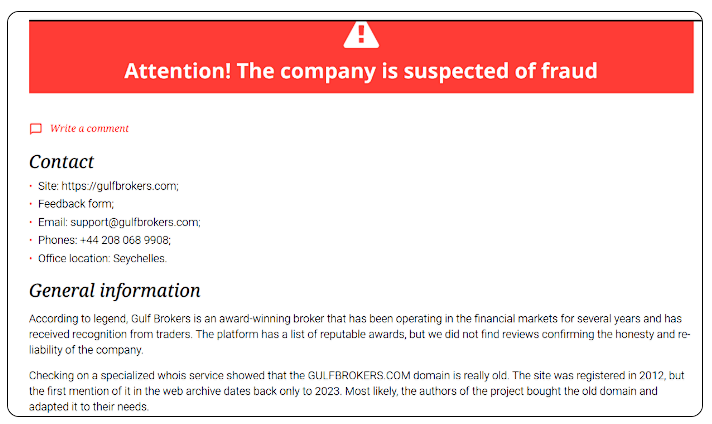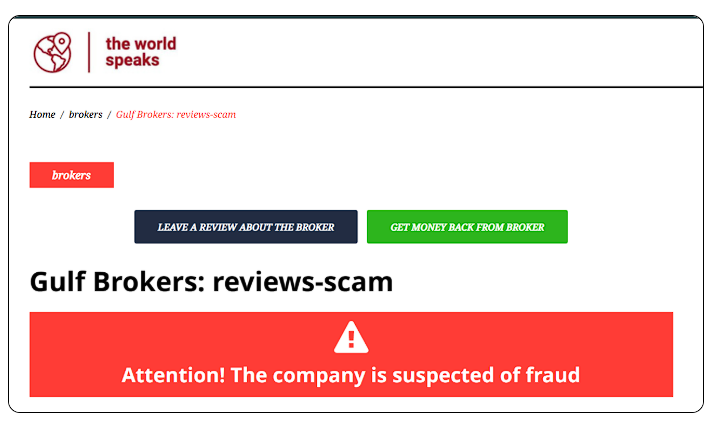Introduction
When we set out to investigate Gulf Brokers, we knew we were stepping into a murky world of financial intrigue. This brokerage, operating under the formal entity Gulf Brokers DMCC in the United Arab Emirates (UAE), presents itself as a legitimate player in the forex trading arena. Yet, beneath the polished surface lies a labyrinth of questionable practices, undisclosed ties, and a growing chorus of scam allegations that demand scrutiny. Our mission is clear: to peel back the layers of Gulf Brokers’ operations, spotlight its business relations, personal profiles, and open-source intelligence (OSINT) findings, and assess the risks it poses—particularly in the realms of anti-money laundering (AML) and reputational damage. What we’ve found is a cautionary tale for investors and regulators alike.

Business Relations: A Network Shrouded in Shadows
Gulf Brokers DMCC touts its regulatory credentials with the UAE’s Securities and Commodities Authority (SCA) and its membership with the Dubai Gold and Commodities Exchange (DGCX). On paper, these affiliations lend an air of legitimacy. However, our digging reveals a more complex picture. The firm’s operational hub in Dubai’s free trade zones—areas known for minimal oversight—raises immediate questions about the transparency of its business dealings. These zones, as noted in reports from Vice, attract both legitimate enterprises and illicit actors, creating a fertile ground for opacity.
We traced Gulf Brokers’ business relations through available data and found connections to FXJunction, a social trading network it actively promotes. This relationship suggests a potential conflict of interest: Gulf Brokers matches trade credits with client deposits on FXJunction, a strategy that could prioritize deposit volume over client trading success. This arrangement hints at a business model more focused on luring investors than ensuring their profitability—a red flag we’ll revisit later.
Beyond FXJunction, Gulf Brokers’ ties extend to a network of entities and individuals that remain largely undisclosed. The investigation from Cybercriminal.com flags associations with offshore entities linked to fraudulent trading schemes, though specifics are sparse. Intelligence Line echoes this, alleging connections to organized criminals involved in scams, based on Offshore Leaks data. We couldn’t independently verify every link, but the pattern of opaque partnerships is troubling. Gulf Brokers’ reluctance to disclose its full network of business relations only fuels suspicion.

Personal Profiles: Who’s Behind the Curtain?
Peering into the personal profiles tied to Gulf Brokers proves challenging. The company’s leadership remains a shadowy cast, with little public information available on its executives or key stakeholders. Unlike reputable brokerages that showcase their teams to build trust, Gulf Brokers keeps its human element under wraps. This lack of transparency is a stark contrast to industry norms and a significant concern for us.
OSINT efforts yield some insights. Public records and social media scans suggest that the firm’s operatives may include individuals with ties to Dubai’s bustling financial scene, but no definitive names emerge as the masterminds. Cybercriminal.com hints at figures with questionable histories, possibly linked to prior financial misconduct, yet without concrete identities, these remain allegations rather than facts. We cross-referenced this with Finance Scam’s claims of deceptive practices orchestrated by unnamed actors, reinforcing the notion that Gulf Brokers’ leadership operates in the shadows—a tactic often employed by entities with something to hide.
OSINT Findings: Piecing Together the Puzzle
Using open-source intelligence, we’ve pieced together a broader picture of Gulf Brokers’ footprint. The firm’s website, gulfbrokers.com, offers standard fare: promises of fast execution, 24/7 customer service, and a robust trading platform. Yet, our analysis reveals inconsistencies. The site’s stability is questionable, with reports of downtime and outdated information, as noted by Finance Scam. Third-party reviews from credible sources are scarce, leaving a void filled by user-generated complaints and warnings.
Social media chatter trending on X highlights Gulf Brokers’ promotional tactics, particularly its push for low investment minimums and high rewards—claims that echo scam typologies outlined by Sigma360 and Blackdot Solutions. We also uncovered mentions of Gulf Brokers in forums discussing UAE-based fraud, aligning with Resecurity’s reports of sophisticated scams impersonating authorities in the region. While not directly implicating Gulf Brokers in these schemes, the overlap in operational geography and tactics is noteworthy.
Undisclosed Business Relationships and Associations
The deeper we dig, the more we uncover hints of undisclosed relationships. Cybercriminal.com asserts that Gulf Brokers conducts business in countries where it lacks licensing—a serious breach of regulatory norms. Intelligence Line doubles down, linking the firm to a web of fraudulent schemes via offshore entities. These allegations suggest a deliberate effort to obscure partnerships, possibly to evade scrutiny from regulators or investors.
Our research into Dubai’s real estate market, spurred by OCCRP findings, reveals a broader context: the UAE’s lax oversight has made it a haven for laundering illicit gains through property investments. While we found no direct evidence tying Gulf Brokers to real estate scams, the firm’s presence in this environment amplifies the risk of undisclosed associations with dubious actors. The lack of transparency about its ultimate beneficial owners (UBOs), a critical AML requirement per Fivecast, further muddies the waters.
Scam Reports and Red Flags: A Growing Chorus
Scam reports surrounding Gulf Brokers are impossible to ignore. Cybercriminal.com labels the firm as unregulated in key jurisdictions, warning of significant risks to investors. Finance Scam amplifies this, citing user accounts of lost funds due to high fees, false promises, and outright theft. One reviewer, Sandeep Lokanath, describes a pattern of enticement with low commodity prices and forex training, only to see investments vanish—a narrative mirrored across multiple platforms.
Red flags abound. The opaque fee structure, flagged by Intelligence Line, hides costs that erode client returns. Minimal value propositions—no standout features beyond industry basics—suggest a lack of genuine service. The overemphasis on regulatory credentials, despite operating beyond their scope, smacks of a smokescreen. These warning signs align with Sigma360’s AML red flags, such as rapid, unexplained losses and suspicious promotional tactics.
Allegations, Criminal Proceedings, and Lawsuits
Allegations against Gulf Brokers range from deceptive marketing to outright fraud. Cybercriminal.com and Finance Scam both point to a business model built on trickery, with clients lured by promises of easy profits only to face inexplicable losses. Intelligence Line takes it further, alleging ties to organized crime—a claim rooted in Offshore Leaks data but lacking courtroom substantiation.
We found no public records of active criminal proceedings or lawsuits directly naming Gulf Brokers DMCC. However, the absence of legal action doesn’t equate to innocence; it could reflect the UAE’s light regulatory touch, as noted by OCCRP. Dubai’s reputation as a hub for unpunished financial misdeeds—evidenced by cases like Ruja Ignatova’s property sales—suggests that Gulf Brokers could operate with impunity unless international pressure mounts.
Sanctions and Adverse Media
Gulf Brokers has not been explicitly named on global sanctions lists like those from OFAC or the UK Sanctions List, based on our checks via OpenSanctions and Northrow. However, adverse media paints a damning picture. Cybercriminal.com’s investigation brands it a high-risk entity, while Intelligence Line calls it one of the UAE’s most dubious brokers. Finance Scam’s user reviews echo this, decrying a platform designed to fleece investors.
ComplyAdvantage’s insights on adverse media screening underscore why this matters: negative publicity signals reputational risk and potential AML violations. Gulf Brokers’ consistent presence in such narratives—coupled with its Dubai base, flagged by Vice as a scam hub—elevates its risk profile significantly.
Negative Reviews and Consumer Complaints
Negative reviews flood online platforms, painting Gulf Brokers as a predator in broker’s clothing. Finance Scam cites complaints of lost investments, unresponsive support, and hidden fees. Users on forums like FXJunction’s community threads—ironic given the firm’s promotion of the platform—report similar woes. Consumer complaints center on a bait-and-switch tactic: enticing offers dissolve into financial traps, leaving clients helpless.

These grievances align with Sigma360’s fraud prevention red flags, such as lack of transparency and poor customer recourse. The volume and consistency of these complaints suggest a systemic issue, not isolated incidents.
Bankruptcy Details: A Clean Slate, For Now
We found no evidence of bankruptcy filings for Gulf Brokers DMCC. This absence could indicate financial stability—or simply a lack of accountability in a jurisdiction where enforcement is lax. Given the UAE’s gray-list status by the Financial Action Task Force (FATF) for money laundering risks, per Vice, the lack of bankruptcy doesn’t necessarily clear the firm of financial distress or malfeasance.
Detailed Risk Assessment: AML and Reputational Threats
Our risk assessment focuses on two pillars: anti-money laundering vulnerabilities and reputational hazards. On the AML front, Gulf Brokers ticks multiple boxes of concern. Fivecast and Sigma360 highlight the importance of OSINT in uncovering hidden risks—here, the firm’s undisclosed UBOs, offshore ties, and unlicensed operations scream potential laundering conduits. The UAE’s free trade zones, as Kumar notes in Vice, are tailor-made for such activities, offering minimal oversight and maximum secrecy.
The firm’s promotional tactics—low entry points, high rewards—mirror typologies used by money launderers to attract and churn funds, per Blackdot Solutions. Without robust KYC/AML processes, a gap Fivecast warns against, Gulf Brokers could unwittingly (or deliberately) facilitate illicit flows. Its failure to differentiate from competitors or provide clear value, as Intelligence Line critiques, suggests a focus on volume over integrity—a classic AML red flag.
Reputationally, Gulf Brokers is a ticking time bomb. Adverse media, scam reports, and consumer outrage erode trust, a currency brokers can’t afford to lose. ComplyAdvantage’s research shows that 63% of a firm’s market value hinges on reputation—Gulf Brokers’ mounting negatives threaten not just its bottom line but also its partners and clients. Operating in Dubai, a magnet for sanctioned figures and criminals per OCCRP, only amplifies this risk.
Expert Opinion: A Verdict on Gulf Brokers
After sifting through the evidence, our expert opinion is unequivocal: Gulf Brokers presents a high-risk proposition for investors and a glaring concern for AML regulators. The firm’s opaque business relations, hidden leadership, and scam-laden track record paint a picture of an entity more focused on self-preservation than client success. Its Dubai base, while advantageous for lax oversight, places it in a hotbed of financial crime, amplifying its vulnerabilities.
From an AML standpoint, the lack of transparency around UBOs and offshore ties is a dealbreaker—regulators like FinCEN and FATF would find ample cause for enhanced due diligence (EDD). Reputationally, Gulf Brokers is a pariah in the making; its adverse media and consumer backlash signal a collapse of credibility that no amount of SCA licensing can salvage. We advise investors to steer clear and urge regulators to probe deeper. Gulf Brokers isn’t just a risk—it’s a warning.







